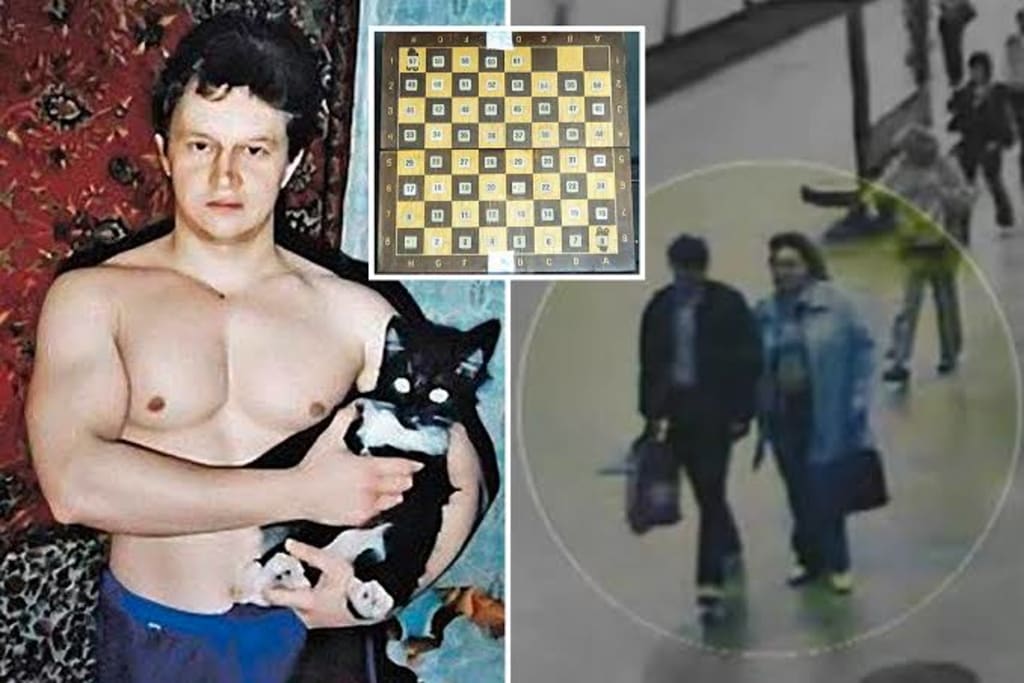Alexander Pichushkin ("Chessboard Killer")
Alexander Pichushkin, commonly known as the "Chessboard Killer," is a notorious Russian serial killer who terrorized Moscow from 1992 to 2006

Alexander Pichushkin ccommonly known as the cChessboard Killer" is a notorious Russian serial killer who terrorized Moscow from 1992 to 2006. His gruesome crimes and unique modus operandi earned him his chilling nickname, which refers to his goal of filling all 64 squares on a chessboard by committing 64 murders. Pichushkin's case offers a disturbing insight into the mind of a serial killer and the challenges of investigating and prosecuting such heinous crimes.
Born on April 9, 1974, in Mytishchi, a suburb of Moscow, Pichushkin exhibited troubling behavior from an early age. He reportedly showed cruelty towards animals and was often bullied by his peers. His life took a tragic turn when his father died, leaving him emotionally scarred and isolated. As a teenager, Pichushkin began indulging in alcohol and developed a fascination with violent and criminal activities.
Pichushkin's killing spree began in earnest in the late 1990s. He targeted mostly elderly men, luring them to secluded areas, and then attacking them with blunt objects, such as hammers or pipes. He often left the victims' bodies in densely wooded areas or construction sites, making it difficult for authorities to locate them. As his body count grew, he started to keep a tally of his murders, etching marks on a chessboard he carried with him.The Chessboard Killer's reign of terror was brought to an end in 2006 when he was finally arrested. The breakthrough in the case came when a surviving victim, who had been attacked but managed to escape, identified Pichushkin as the assailant. Police then apprehended him and discovered evidence linking him to several murders, including the chessboard with its macabre markings.
During the investigation and subsequent trial, Pichushkin claimed to have committed over 60 murders, a number that aligned with his goal of filling all the squares on the chessboard. However, law enforcement was able to conclusively link him to 48 murders, making him one of the most prolific serial killers in Russian history. Pichushkin's trial garnered significant media attention, both in Russia and internationally, shedding light on the disturbing details of his crimes and the psychology behind serial killers.
Psychological evaluations of Pichushkin revealed a complex and disturbed individual. He expressed a desire for fame and recognition, often comparing himself to other notorious serial killers. Pichushkin's crimes were seen as a twisted attempt to achieve notoriety, further evidenced by his use of the chessboard as a morbid scoring system. This psychological need for attention and dominance over his victims gave rise to his chilling moniker.
In October 2007, Pichushkin was found guilty of 48 counts of murder and sentenced to life imprisonment. Russian law at the time did not include the possibility of parole for individuals convicted of multiple murders. His conviction marked a significant step in the Russian legal system's response to serial killers, demonstrating that even the most prolific offenders could be held accountable for their actions.The case of Alexander Pichushkin remains a haunting reminder of the darkness that can reside within human nature. It raises questions about the roots of extreme violence and the psychological factors that drive individuals to commit such heinous acts. Pichushkin's peculiar fixation on a chessboard as a symbolic representation of his killings underscores the twisted complexity of his motivations.
In Brief the tale of the Chessboard Killer is a grim chapter in the annals of criminal history. Alexander Pichushkin's reign of terror left a deep scar on Moscow, and his capture and conviction provided a glimpse into the disturbing psyche of a serial killer. While the case shed light on the challenges of investigating and prosecuting serial killers, it also highlighted the determination of law enforcement to bring justice to the victims and their families. The legacy of the Chessboard Killer serves as a cautionary tale and a reminder that the human capacity for evil can manifest in unimaginable ways.
About the Creator
Enjoyed the story? Support the Creator.
Subscribe for free to receive all their stories in your feed. You could also pledge your support or give them a one-off tip, letting them know you appreciate their work.





Comments
There are no comments for this story
Be the first to respond and start the conversation.